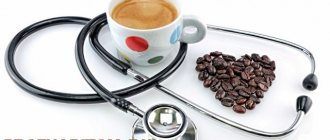How does coffee increase blood pressure?
Caffeine is a vasoconstrictor, which means it constricts blood vessels and can increase blood pressure. Caffeine exerts its effects by interacting with various receptors in the brain. Experts believe that compounds in coffee, such as antioxidants, have a protective effect on blood vessels.
The benefits and risks of drinking coffee remain controversial as research to date is inconclusive.
Long-term effects of drinking coffee
According to a 2021 review, increased coffee consumption is associated with a small decrease in hypertension rates. Researchers found a 9% reduction in risk for drinking 7 cups per day, and a 1% reduction in risk for each additional cup per day.
The same review found that beneficial compounds in coffee, such as phenols, may have protective effects. The researchers also noted that genetic variations may influence how a person metabolizes caffeine.
How does coffee affect overall human health?
The effect of a cup of aromatic drink depends on the strength of the coffee and how much of the alkaloid enters the body. Drink instant coffee? Get ready for a sharp blow to the blood vessels. They will account for 100% of the caffeine.
Prepared black coffee from ground beans? The taste and aroma are delicious, but caffeine has a milder effect. How so? It all depends on the grind, the type of beans and the recipe. Here are the approximate caffeine content per serving:
- natural ground – 40-60 mg.
- soluble – 60-100 mg.
How much of the drink can be beneficial? Two to three cups of ground. How much harm will they do? Five cups of instant - for sure. This will manifest itself as irritability, fatigue and apathy.
Starting the day with a coffee drink is practically the norm for many, but there is a risk of getting hooked. How to understand that a hobby crosses the boundaries of what is acceptable? The frequency and volume of administration is increasing.
Exceeding 5 cups of coffee per day is a bad sign. The body takes coffee for granted, and after a new portion, vigor no longer comes. The reason for this is that a person unnaturally activates the brain, and the body has reached the limit of its capabilities. That’s why even for hypotensive people, two cups a day is the maximum threshold.
The drink accelerates the loss of calcium by the body, which leads to the following consequences:
- the nervous system and muscles work worse;
- the vessels are constantly narrowed, but blood pressure does not fall;
- the adrenaline rush just goes off scale, raising blood pressure.
You can also analyze the harm by individual organs:
- Brain – dizziness becomes more frequent, agitation and anxiety increase.
- Eyes – vision is blurred due to the flickering of flies.
- Muscles – tremors of varying intensity and even spasms.
- Ears - noisy and ringing;
- Stomach and intestines – loss of appetite, pain and nausea.
- Heart and lungs - pulse and breathing become faster.
- Kidneys – the urinary process occurs more intensely.
Moderate use of the drink
If you do not violate the measures and drink coffee in moderation, your body will receive many benefits:
- Metabolism occurs faster.
- Attention and memory become better.
- Diabetes develops less frequently.
- A person receives additional energy and works more actively.
- Heart function improves.
- The senses function more perfectly.
- The risks of oncological processes decrease.
Caffeine in moderate quantities has only positive effects for the following organs and systems:
- The central nervous system is activated.
- The kidneys work faster.
- The swelling goes away.
- Appetite is stimulated.
- Intoxication is relieved.
- The heart contracts more actively.
If a maximum of 2-3 cups of aromatic drink are drunk per day, then the risk of developing hypertension is confirmed by both doctors and statisticians. Do you drink coffee more often? Health risks are increasing.
What are the benefits for the heart and vascular system?
Here's how invigorating nectar affects the body:
- Are the cardiovascular organs normal? The pressure in the arteries is stable and unchanged.
- Do you have hypertension? The risks of rising blood pressure are so great that there is a risk of heart attack and stroke.
- Sometimes the pressure drops, but not for long. Why? Due to the drink’s ability to relieve vasospasm and improve blood flow in microcapillaries.
Combination with smoking
The combination of coffee and cigarette is simply a classic for most, but is it healthy? Doctors say: nicotine and caffeine with high blood pressure will cause much more harm together than separately. Even for a healthy person, such a combination will undermine the functioning of the heart and blood vessels, weaken the nerves and ruin the appetite.
What happens when you smoke:
- The heart contracts more intensely.
- Blood pressure increases.
Safe caffeine enhances the harmful effects of nicotine because their activity is similar. This increases threats to the heart and blood vessels.
In addition, the combination of coffee and cigarettes triggers the synthesis of the protein homocysteine in the body, which increases the risk of stroke and heart attack hundreds of times.
For you:
Arabica, Robusta and other coffee beans
Is it okay to drink coffee if you have high blood pressure?
The researchers concluded that people with high blood pressure should exercise some caution when drinking coffee, but should not avoid it. Studies have shown that 3-4 cups per day have either neutral or beneficial effects.
A 2021 study of 40 healthy people who regularly consumed coffee found that all types of coffee increased blood pressure, but levels remained within healthy ranges. The increase in blood pressure was temporary and returned to normal 3 hours after drinking coffee. Some studies show that the amount of coffee a person drinks determines its effect on blood pressure.
A 2015 study found an increase in systolic blood pressure only in those who did not drink coffee frequently. Another review found that habitual coffee consumption of more than 3 cups per day does not increase the risk of hypertension. However, there was a slightly increased risk associated with 1-3 cups per day.
Impact on blood pressure levels
A stereotype has developed: I drank coffee and my blood pressure went up. But this is not always the case. Is your blood pressure always stable? A cup of espresso easily tones the body: blood vessels will dilate and a weak diuretic effect will appear. As a result, the pressure will drop slightly. This happens to 15% of those who like to indulge in a tasty and invigorating drink.
For persistent hypotension with perpetually low blood pressure, coffee is a real salvation. Blood pressure normalizes, and symptoms of weakness recede, giving a feeling of complete health. Drinking the drink will not harm such people, but will only help. The main thing is to know when to stop.
But if the doctor has diagnosed hypertension, then it is better to exclude this product from the diet. This drink is detrimental to stabilizing blood pressure. Drinking caffeine raises blood pressure for a long time.
How does it affect blood pressure?
The health of hypertensive patients responds worst to the aromatic drink. One cup of coffee – and blood pressure increases, albeit slightly, but for a very long time. Normalization of pressure occurs only over time or after taking the pill. It is better for such people to forget about the coffee ceremony.
If the pressure is always normal (120/70; 110/60; 130/80), then drinking espresso will not change the readings on the tonometer. Coffee has no effect on the body or blood pressure levels.
But coffee fights hypotension very effectively, giving vigor and increasing blood pressure. What else? Weakness and bad mood go away. Many hypotensive people cheat by raising their blood pressure not only with a grain drink, but also with treats that contain more than enough of it: chocolate, Coca-Cola and tonics.
They say that coffee with cognac does not increase blood pressure levels. Why? Cognac lowers the tone of the vascular wall, and blood pressure decreases. But at the same time, the heart rhythm begins to become capricious, and the pressure can rise sharply. Alcohol is also very toxic to the liver.
In general, a cup or two of coffee with a small portion of cognac will not do any harm at all.
How much does coffee raise blood pressure?
As already mentioned, the drink does not have the same effect on everyone, which is why researchers have not yet been able to say exactly about the harm or benefit of the drink on the increase or decrease in blood pressure.
If you drink coffee, how will your blood pressure behave? In people with healthy hearts and blood vessels, blood pressure rises after 2-3 servings of coffee:
- upper (systolic) blood pressure – by 8-10 units;
- lower (diastolic) - by 5-7 units.
This continues for 1-3 hours, and is true only if a person does not constantly replenish the “reserve of vigor”.
Caffeine activates the brain and the release of stress hormones, blood vessels become toned, and the heart begins to beat faster. The survey also affected people with problematic blood pressure. After a cup of coffee, they began to complain of chest tightness and vasospasm.
At what pressure is it contraindicated?
This question has repeatedly become the topic of scientific experiments. And here are the results. Do you have a tendency to have high blood pressure? It is better to forget about frequent consumption of invigorating drinks. A cup of espresso sometimes results in a stroke or heart attack.
But how do you understand that a person is hypertensive? The diagnosis is usually made by a cardiologist or internist.
Just remember: pressure surges occur after hard work, sports activity, or emotional experience. People owe the increase in blood pressure to excess weight, heredity, and also to pathologies of the kidneys and thyroid gland.
When should you sound the alarm? If during the day the pressure does not drop below 140/90.
For you:
At what age can children drink coffee?
How to understand that a fragrant drink has affected your blood pressure? After drinking a cup, the face turned red, forgetfulness and headache appeared, and sometimes weakness and even nausea.
But the tradition of drinking natural coffee is not the cause of hypertension. Even doctors have no doubts about this fact.
Is the blood pressure reading consistently lower than 130/85? A cup of aromatic and invigorating will not harm. But if the threshold is constantly exceeded, give up this drink and drink herbal teas, compotes and juices.
A drink made from coffee beans is useful because it reduces the risks of developing cancer, diabetes, atherosclerosis and asthma, increases metabolism and weight loss.
When to stop drinking coffee
Some people believe that drinking coffee causes insomnia, anxiety, and tremors. Others may notice reflux and heartburn. Anyone who has symptoms caused by coffee should avoid drinking it.
According to the researchers, regular coffee drinkers may experience withdrawal symptoms, such as caffeine withdrawal headaches and low mood, when they suddenly stop drinking. Therefore, if you want to reduce your coffee consumption, you should gradually reduce the number of cups.
The authors of a review in the journal JACC: Clinical Electrophysiology note that some doctors recommend that patients with atrial fibrillation or other conditions associated with irregular heartbeats avoid coffee. However, scientists have concluded that regular consumption of up to 300 milligrams of caffeine per day appears safe and may even protect against heart rhythm problems. However, the researchers cautioned that if there is a clear link between arrhythmia episodes and caffeine, you should stop drinking coffee.











